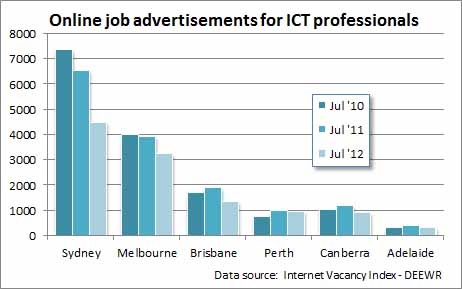Jobwatch: Sydney takes a hit; recruiters to blame?

Two years ago, Sydney was the place to be if you were an ICT professional looking for a new job. In July 2010, there were 7369 online vacancies (according to data gathered by the Department of Education, Employment and Workplace Relations), which was almost half of the total jobs advertised in all state capitals. Last month, Sydney accounted for just 39 per cent of the vacancies.
The Sydney figures skew the nationwide results; the city's IT job numbers have fallen by 40 per cent over the last two years (July 2010 to July 2012). Other cities have had comparatively moderate falls over the same period. Melbourne vacancies have fallen by less than 20 per cent, but locals will be feeling the heat as Sydneysiders head south for work.
Overall, the total vacancies for all capitals has fallen from 15,330 in July 2010 to 11,395 last month — a 26 per cent drop. As the chart clearly shows, the sharpest fall has been in the last year. Only Perth has bucked the trend, with vacancies increasing a little over the last couple of years — but even there, the last year has seen a slight slide.

It seems unlikely that contract work is holding back the number of full-time vacancies. The latest Longhaus-ITCRA Australia Tech Index shows that companies are far more likely to be reducing the number of contracting staff than in-house; just 6 per cent of those who were surveyed plan to cut full timers, whilst 24 per cent aim to reduce contracting staff. And, as reported recently on ZDNet, most are offering shorter-term ICT contracts to drive down costs in the face of economic uncertainty.
Should recruiters take part of the blame for the lack of vacancies? Despite the apparent shortage of jobs, they continue to highlight difficulties in finding suitably qualified candidates. That's because the industry is changing so quickly, with new jobs emerging that often demand experience in technologies that didn't even exist a couple of years ago. This could also account for the shift to shorter-term contracts, as companies trial those who profess "expertise" in emerging areas.
Perhaps recruiters could be a little more flexible in their criteria, and allow smart people to learn on the job. It's an old-fashioned notion, but maybe aptitude should be given an equal weighting with direct experience. For example, when the first passenger railway opened in 1825, did recruiters advertise for experienced train drivers? No.
They found people who could pick up the skill. A similar approach to mobility, the cloud and other emerging technologies would see more jobs filled, more expertise acquired and a national skill base built that allows Australian IT to compete in a rapidly changing international environment.